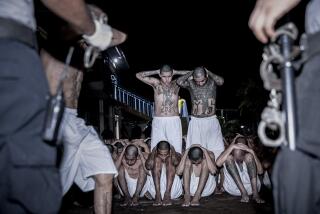Balkan Peace Agreement Met With Pessimism in Southland : Reaction: After so much violence, ethnic Serbs, Croats and Bosnian Muslims express their doubts.
Although builder Milo Neric and grocery store owner Jerry Kolper--one a Serb, the other a Croat--both trace their roots to the Balkans, when it comes to the war there they agree only on one thing: Peace won’t happen.
Neither man believes that a peacekeeping force--even one including U.S. soldiers--will be able to keep the warring factions from continuing the bloodshed that has plagued their country for years.
When Neric and Kolper learned this week that President Clinton helped forge a Bosnia peace treaty after intensive negotiations in Dayton, Ohio, their diametrically opposed political views converged to form the same conclusion.
“The peace settlement is never going to go through,” said Neric, a Serbian American from Phoenix who is visiting friends in Los Angeles. “There’s going to be more killing. It’s going to be 10 times worse than Vietnam.”
Kolper was equally glum.
“There’s too much hatred,” the Croatian American said. “Too many bad things have happened that will never be forgotten. That hatred will be there for a long, long time to come.”
The bloody war that has divided the former Yugoslav federation 7,000 miles away has also created deep chasms in the local ethnic communities, which include about 100,000 Croats, 30,000 Serbs and thousands of Bosnian Muslims.
Kolper, for instance, used to count several Serbs as friends. But after one Serbian customer began boasting about what a drubbing the Croats were receiving at the hands of Serbs, Kolper banished him from his San Pedro store and let it be known that he did not need that kind of patronage.
“You can only take so much before you say, ‘Hey, we don’t need your business,’ ” Kolper explained. “I believe in the saying: an eye for an eye, a tooth for a tooth.”
Serbs, Croats and Muslims alike said they welcomed the prospect of peace but placed little stock in it actually occurring after so much violence. Such animosity, locals say, cannot be erased with one peace treaty, hard-won after years of savage war. The mistrust cannot simply be dismissed, they say.
Why won’t the peace settlement work?
“I can tell you in four words: I don’t trust Serbs,” said Regina Herceg, a Croat, summing up a mutual distrust felt by the warring factions.
Bill Dorich, president of the Serbian-American Voters Alliance, was equally adamant.
“It’s an outrage,” he said. “Now we are going to have the Serbs forced out of Bosnia.”
Many agreed that their families and friends in Bosnia-Herzegovina are ready for peace, ready to live lives without fear. But the desire for peace will not easily translate into reality.
“People are not at peace, and they won’t be for many years,” said film student Tarek Suleimanagich, a second-generation Bosnian American Muslim. “Are they tired of fighting? Yes. Are they feeling sorry for themselves? Yes. Will they want revenge? No doubt.”
Even so, Suleimanagich believes that, at least for a time, peace will prevail. “There will be so much renewal of lifestyle, people will be so focused and overwhelmed with that notion, rather than trying to pick up a gun and kill their neighbors.”
For others, the peace treaty heightened optimism that the Balkans’ bloody past is indeed behind it.
John Fegaric, pastor of St. Anthony’s Croatian Catholic Church, has lived in San Pedro for 35 years.
Four years ago, when Croatia declared independence from Yugoslavia, he ordered that the church bells be rung to celebrate. And on Tuesday, the day that Balkan leaders approved a treaty, Fegaric--who still has family living in Croatia--ordered the bells to be rung once again.
“I’m grateful that we finally have some kind of agreement,” he said. “It’s not perfect, but it may be the best we can have in the circumstances. Let’s hope and pray it works.”
More to Read
Sign up for Essential California
The most important California stories and recommendations in your inbox every morning.
You may occasionally receive promotional content from the Los Angeles Times.






